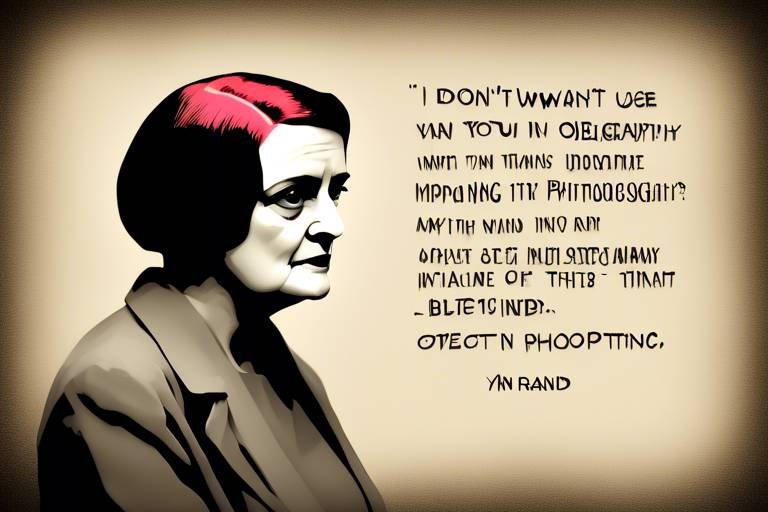Ayn Rand’s Philosophy: Objectivism Explained
Ayn Rand's philosophy, known as Objectivism, is a profound exploration of the nature of reality, human existence, and the moral framework that guides our lives. Born in Russia and later emigrating to the United States, Rand developed her ideas during a time of significant political and social upheaval. Her philosophy champions the individual and promotes a system of thought that emphasizes reason, self-interest, and capitalism. This article delves into the core principles of Objectivism, its implications for society, and the criticisms it has faced over the years.
At the heart of Objectivism are several fundamental principles that serve as the foundation for Rand's vision of a rational, ethical society. These principles include:
- Reality: Objectivism asserts that reality exists independent of consciousness. This means that the world around us is objective and can be understood through reason.
- Reason: Rand believed that the primary means of human survival is through the use of reason. She argued that rational thought is essential for making informed decisions and achieving personal goals.
- Self-Interest: Rand posited that pursuing one's own happiness is a moral imperative. This concept of rational self-interest is crucial to understanding her ethical framework.
- Capitalism: For Rand, capitalism is the only moral social system because it allows individuals to act according to their own rational self-interest.
Understanding these concepts is essential for grasping how Rand envisioned a society where individuals thrive through their own efforts and creativity.
Individualism is a cornerstone of Objectivism, highlighting the significance of personal rights and freedoms. Rand fiercely defended the individual's right to live for themselves, arguing that collectivism and societal constraints stifle human potential. In her view, the individual is the primary unit of society, and their rights should not be sacrificed for the sake of the collective. This philosophy resonates in contemporary discussions about personal liberties, as it challenges us to consider the balance between individual rights and the demands of the group.
One of Rand's most controversial claims is that rational self-interest is a moral virtue. She believed that when individuals pursue their own happiness, they contribute to the overall progress of society. This perspective shifts the narrative around self-interest from a negative connotation to a positive one, suggesting that looking out for oneself can lead to greater societal benefits. Rand's philosophy encourages individuals to embrace their passions and ambitions, arguing that personal fulfillment ultimately leads to a more prosperous community.
The ethical framework surrounding self-interest is pivotal in Objectivism. Rand proposed that morality should be based on the principles of rationality and individual rights, rather than on altruism or self-sacrifice. This leads to a profound shift in how we perceive ethical behavior, as individuals are encouraged to act in their own best interests while respecting the rights of others. The implications for personal and social conduct are significant, as this philosophy promotes a society where individuals are empowered to make choices that enhance their lives.
Rand's critique of altruism is one of the most striking aspects of her philosophy. She viewed altruism as a moral failing that undermines individual potential and promotes self-sacrifice at the expense of personal happiness. By prioritizing the needs of others over one's own, Rand argued that individuals diminish their own value and capabilities. This perspective invites a reevaluation of our cultural norms surrounding selflessness and raises important questions about the morality of prioritizing collective welfare over personal gain.
Objectivism advocates for laissez-faire capitalism as the only moral social system. Rand believed that economic freedom is essential for individual rights and personal success. In her view, a free market allows individuals to trade their goods and services voluntarily, fostering innovation and creativity. This connection between economic freedom and individual rights is a central theme in Rand's work, as she argues that capitalism is not just an economic system but a reflection of a society that values personal liberty and self-determination.
Despite its influence, Objectivism has faced significant criticism from various quarters. Critics argue that Rand's philosophy oversimplifies complex moral issues and neglects the nuances of human relationships. Some contend that her emphasis on individualism can lead to a lack of social responsibility and empathy. Additionally, the practical implications of Objectivism raise questions about its feasibility in a world where interdependence is often necessary for survival.
Philosophical challenges to Objectivism often center around the balance between individual rights and social responsibilities. Critics suggest that Rand's framework may not adequately address the complexities of human interaction and the ethical dilemmas that arise in a diverse society. These objections encourage a deeper examination of how we define morality and the role of the individual within the community.
The real-world application of Objectivism presents challenges, particularly in terms of its implementation in contemporary society. While Rand's ideas resonate with many, the practicality of a purely capitalist system raises concerns about inequality and access to resources. As we navigate the complexities of modern life, it's crucial to consider how Rand's philosophy can be adapted to address these issues while still honoring the principles of individualism and freedom.
1. What is Objectivism?
Objectivism is a philosophy developed by Ayn Rand that emphasizes reason, individualism, and capitalism as the foundation for a rational and ethical society.
2. Why is individualism important in Objectivism?
Individualism is crucial because it asserts the importance of personal rights and freedoms, positioning the individual as the primary unit of society.
3. How does Objectivism view altruism?
Objectivism critiques altruism as a moral failing that undermines individual potential and promotes self-sacrifice at the expense of personal happiness.
4. What are the criticisms of Objectivism?
Critics argue that Objectivism oversimplifies complex moral issues and neglects the nuances of human relationships, raising concerns about its practical implications in society.

Core Principles of Objectivism
Objectivism, the philosophical system developed by Ayn Rand, is underpinned by a set of core principles that collectively define her vision of a rational, ethical society. At the heart of Objectivism lies the belief in reality as an absolute, which means that the world exists independently of our perceptions or feelings. This foundational idea emphasizes that reality is objective and can be understood through reason, the primary means by which humans gain knowledge. Rand posits that to thrive, individuals must embrace reason as their guiding principle, rejecting emotions or whims as valid forms of knowledge.
Another essential tenet of Objectivism is the concept of self-interest. Unlike the traditional view that self-interest is synonymous with selfishness in a negative sense, Rand argues that pursuing one's own happiness is not only rational but also a moral imperative. This pursuit is not about harming others; rather, it’s about recognizing that one’s own well-being is paramount. When individuals act in their self-interest, they inadvertently contribute to the betterment of society as a whole. Think of it as a rising tide that lifts all boats—when individuals succeed, they create opportunities and prosperity for others.
Moreover, Objectivism champions capitalism as the only moral social system. Rand believed that a free market, where individuals can trade value for value, is essential for protecting individual rights and fostering innovation. In her view, capitalism is not just an economic system but a reflection of the moral principle that individuals should be free to pursue their own happiness, so long as they do not infringe on the rights of others. This leads to a society where creativity and productivity flourish, driven by the desires and ambitions of individuals.
To summarize the core principles of Objectivism, we can present them in the following table:
| Core Principle | Description |
|---|---|
| Reality | The world exists independently of our perceptions; it is objective and absolute. |
| Reason | Human beings must use reason as their primary means of knowledge and understanding. |
| Self-Interest | Pursuing one's own happiness is a moral imperative that benefits society. |
| Capitalism | A free market is essential for protecting individual rights and fostering innovation. |
In essence, understanding these core principles is vital for anyone looking to grasp the full depth of Ayn Rand’s philosophy. They serve as the foundation for her arguments against collectivism and her advocacy for a society where individuals are free to pursue their own paths. The implications of these principles extend beyond philosophical discussions; they challenge us to rethink our views on morality, society, and the role of government in our lives.

The Role of Individualism
Individualism stands as a cornerstone of Ayn Rand's philosophy of Objectivism, playing a crucial role in shaping her vision of a rational society. At its core, individualism champions the idea that each person is an autonomous being, responsible for their own choices and actions. This perspective is not merely about self-centeredness; rather, it emphasizes the importance of personal rights and freedoms. Rand believed that every individual should pursue their own happiness and that this pursuit is not only permissible but is a moral imperative.
In a world often dominated by collectivist ideologies, Rand's emphasis on individualism serves as a powerful counter-narrative. She argues that the rights of the individual should never be sacrificed for the sake of the collective. This belief is particularly relevant in contemporary discussions surrounding social justice, where the tension between individual rights and group identity can lead to complex debates. Rand's philosophy insists that the individual should always come first, as the foundation of a healthy society is built upon the freedom and rights of its members.
Consider this analogy: imagine a garden where every plant is unique, each with its own needs for sunlight, water, and space. Just as each plant thrives when given the right conditions, so too does the individual flourish in an environment that respects their personal rights. When society prioritizes the collective over the individual, it risks stifling the very essence of what makes each person unique. This is why Rand's philosophy resonates with those who value personal autonomy and self-determination.
Moreover, Rand's individualism extends beyond mere personal freedom; it encompasses the idea of rational self-interest. She posits that when individuals act in their own best interests, they inadvertently contribute to the greater good. This is because a society composed of individuals pursuing their own happiness is one where innovation, creativity, and progress can thrive. It challenges the notion that altruism is the only path to societal improvement, instead suggesting that self-interest can lead to a flourishing community.
However, the idea of individualism is not without its critics. Some argue that it fosters a sense of isolation and neglect for communal responsibilities. But Rand would counter that true individualism does not preclude cooperation or mutual aid; rather, it promotes voluntary associations based on mutual benefit. When individuals choose to work together, it is a reflection of their freedom to do so, not an obligation imposed by societal norms.
In conclusion, the role of individualism in Objectivism is multifaceted and deeply impactful. It encourages individuals to embrace their rights and pursue their own happiness while recognizing that such pursuits can lead to a more prosperous and innovative society. By understanding and valuing individualism, we can better navigate the complexities of modern life, asserting our rights while fostering positive relationships with others. As we continue to explore Rand's philosophy, the importance of individualism remains a guiding light for those who seek to carve their own paths in a world that often tries to dictate otherwise.
- What is individualism in Objectivism? Individualism in Objectivism emphasizes the importance of personal rights and freedoms, advocating that each person is responsible for their own happiness and choices.
- How does Rand view altruism? Rand critiques altruism, arguing that it undermines individual potential and promotes self-sacrifice over personal gain.
- Is individualism compatible with social responsibility? Yes, Rand argues that true individualism allows for voluntary cooperation and mutual aid, as individuals choose to work together for mutual benefit.

Self-Interest as a Virtue
When we think about self-interest, many of us might picture a cutthroat world where individuals claw their way to the top, trampling over others in the process. However, Ayn Rand flips this notion on its head, suggesting that self-interest is not only essential but also a moral imperative. In her philosophy of Objectivism, Rand argues that pursuing one's own happiness is not a selfish act in the derogatory sense, but rather a fundamental aspect of human existence. Imagine a world where everyone is encouraged to chase their dreams and aspirations—this is the kind of society Rand envisions.
At the heart of Rand's assertion is the belief that when individuals prioritize their own well-being, they inadvertently contribute to the greater good. This might sound counterintuitive, but think about it: when people are motivated to achieve their personal goals, they create value not just for themselves but for society as a whole. For instance, a passionate entrepreneur who seeks to build a successful business does so not only for personal gain but also to provide jobs, innovate products, and improve the quality of life for others. This is the essence of rational self-interest.
Rand's perspective invites us to reconsider how we view altruism and self-sacrifice. She argues that sacrificing one's own happiness for the sake of others is not virtuous; in fact, it can lead to resentment and a lack of fulfillment. Instead, Rand champions the idea that by pursuing our own happiness, we can create a ripple effect of positivity and progress. To illustrate this point, consider the following:
| Self-Interest | Collectivism |
|---|---|
| Encourages innovation and creativity | Stifles individual potential |
| Promotes personal responsibility | Relies on shared burden |
| Fosters competition leading to better products | Encourages mediocrity |
This table highlights how self-interest can lead to a thriving society as opposed to the stagnation often associated with collectivist ideologies. Rand's philosophy doesn't dismiss the importance of community; rather, it emphasizes that a healthy society is built on the foundation of individuals who are free to pursue their own paths. In this light, self-interest becomes a virtue—a catalyst for progress and prosperity.
In conclusion, Rand's notion of self-interest as a virtue challenges us to rethink our understanding of morality. By embracing our own happiness, we not only enrich our lives but also contribute to a more vibrant and dynamic society. So, the next time you hear someone criticize self-interest, remember that it is through the pursuit of our own goals that we can truly uplift others.

Ethics of Self-Interest
The ethics of self-interest in Ayn Rand's philosophy of Objectivism is a fascinating and often misunderstood concept. At its core, Rand argues that pursuing one's own happiness is not just a personal choice but a moral imperative. This idea challenges the traditional views of morality that often prioritize self-sacrifice or altruism over personal fulfillment. Rand posits that when individuals act in their own rational self-interest, they contribute to a more prosperous and ethical society. This notion can be likened to the idea of a rising tide lifting all boats; when one person thrives, it creates opportunities for others to do the same.
To understand the ethics of self-interest, it’s essential to recognize that Rand does not advocate for a selfish or hedonistic pursuit of pleasure at the expense of others. Instead, she emphasizes a rational approach to self-interest, which involves making choices that are in alignment with one's values and long-term goals. This rational self-interest is about making decisions that enhance one's life while respecting the rights of others. In this context, self-interest becomes a guiding principle for ethical behavior, as it leads individuals to create value and engage in mutually beneficial relationships.
Furthermore, Rand argues that self-interest fosters innovation and progress. When individuals are free to pursue their passions and interests, they are more likely to create new products, services, and ideas that benefit society as a whole. This is where the connection between self-interest and capitalism becomes evident. A society that allows individuals to act on their self-interest is one that encourages creativity and economic growth. In contrast, a system that suppresses self-interest often leads to stagnation and mediocrity.
Critics of Rand's ethics of self-interest often argue that this philosophy promotes a lack of compassion and social responsibility. They contend that a focus on individual gain can lead to exploitation and inequality. However, Rand would counter that true compassion arises from the recognition of individual rights and the understanding that each person is responsible for their own life. By fostering an environment where individuals can thrive, society as a whole benefits, creating a win-win scenario.
In summary, the ethics of self-interest according to Ayn Rand is not merely about looking out for oneself; it is about embracing a rational, principled approach to living that ultimately enhances both personal happiness and societal progress. By championing self-interest, Rand invites us to reconsider our ethical frameworks and recognize the profound impact that individual actions can have on the world around us.

Critiques of Altruism
Ayn Rand's philosophy of Objectivism presents a bold stance against the traditional notion of altruism, which she views as a moral failing rather than a virtue. According to Rand, altruism promotes the idea that individuals should prioritize the needs of others above their own, often leading to self-sacrifice and the neglect of one's own happiness. This perspective raises a significant question: can true morality exist when it demands the abandonment of self-interest?
Rand argues that altruism undermines the very essence of individual potential by imposing guilt on those who seek to pursue their own happiness. She believes that when individuals are taught to prioritize the welfare of others over their own desires, they are essentially being conditioned to view themselves as lesser beings. This, she posits, creates a society where mediocrity is celebrated, and exceptionalism is stifled. In her view, the idea of self-sacrifice is not noble; it is a betrayal of one’s own values and aspirations.
To illustrate her critique, Rand often contrasts altruism with her concept of rational self-interest. She posits that when individuals pursue their own happiness and well-being, they inadvertently contribute to the greater good of society. This is because a society composed of individuals striving for their own goals is one that fosters innovation, creativity, and progress. In this sense, Rand's philosophy aligns closely with the principles of capitalism, where the pursuit of personal gain leads to collective advancement.
Moreover, Rand challenges the idea that altruism is inherently virtuous by questioning the motives behind self-sacrificial acts. Are people truly acting out of goodwill, or are they merely seeking validation and approval from society? This skepticism raises an important point: if altruism is motivated by external rewards rather than genuine concern for others, can it truly be considered moral? Rand’s critique encourages us to rethink our understanding of morality and the motivations that drive our actions.
In her works, Rand emphasizes that altruism often leads to a sense of entitlement among those who believe they are owed help and support from others. This creates a cycle where individuals feel justified in demanding sacrifices from others, further entrenching the idea that self-interest is to be shunned. Rand’s perspective invites us to consider the implications of a society built on such principles, where individual rights are sacrificed at the altar of collectivism.
Ultimately, Rand's critique of altruism serves as a call to embrace self-interest as a guiding principle for ethical behavior. By championing the individual and their right to pursue happiness, she argues for a moral framework that values personal responsibility and achievement. In her vision, a society that celebrates individual success is one that thrives, as its members are empowered to contribute meaningfully without the burden of guilt or obligation to sacrifice for others.
- What is Objectivism? Objectivism is a philosophical system developed by Ayn Rand that emphasizes reason, individualism, and capitalism, advocating for the pursuit of one's own happiness as a moral imperative.
- Why does Rand criticize altruism? Rand criticizes altruism because she believes it undermines individual potential, promotes self-sacrifice, and creates a society where mediocrity is accepted over personal achievement.
- How does Objectivism view self-interest? Objectivism views rational self-interest as a virtue, suggesting that pursuing one's own happiness ultimately benefits society as a whole.
- What are the implications of Rand's philosophy for contemporary society? Rand's philosophy encourages individuals to prioritize their own goals and rights, fostering a culture of innovation and personal responsibility while challenging collectivist ideals.

Capitalism and Free Markets
At the heart of Ayn Rand's philosophy lies a robust defense of capitalism and the free market, which she argues is the only moral social system. Rand believed that capitalism is not just an economic system but a reflection of individual rights and freedoms. Imagine a world where each person is free to pursue their own happiness, unencumbered by oppressive regulations or the whims of a collectivist government. This is the world Rand envisioned, where the invisible hand of the market guides individuals to create wealth and improve society.
Rand posited that in a truly free market, individuals voluntarily exchange goods and services, leading to mutual benefits. This exchange is a natural extension of her belief in self-interest. When individuals act in their own interest, they inadvertently contribute to the greater good. For instance, when a baker produces delicious bread, he does so not out of a desire to feed the entire community but to earn a living. However, by doing so, he feeds the community, demonstrating how self-interest can lead to societal progress.
Moreover, Rand argued that capitalism is synonymous with freedom. In her view, the ability to own property and engage in trade is a fundamental human right. This is where capitalism diverges from other economic systems, such as socialism, which often prioritize collective ownership over individual rights. Rand believed that when the government intervenes in the economy, it stifles innovation and creativity, ultimately harming society. To illustrate this point, consider how technological advancements often arise in capitalist societies where entrepreneurs are free to take risks and pursue their passions.
The implications of Rand's philosophy on capitalism extend beyond economics. She believed that a capitalist society fosters a culture of achievement and meritocracy. In such a society, individuals are rewarded based on their abilities and contributions rather than their adherence to societal norms or collective expectations. This creates an environment where people are motivated to excel, leading to a flourishing culture of innovation and progress. Think of the myriad of inventions and advancements that have emerged from capitalist societies—these are not mere coincidences but the results of individuals striving to fulfill their potential.
However, it's essential to acknowledge that Rand's unyielding support for capitalism does not come without its challenges. Critics often argue that unregulated markets can lead to inequality and exploitation. They contend that without some level of government intervention, the rich may get richer while the poor remain marginalized. To address these concerns, Rand would argue that the responsibility of ensuring fair play lies with the individuals themselves, and that a truly free market would naturally regulate itself through competition and innovation.
In conclusion, Rand's vision of capitalism and free markets is deeply intertwined with her overarching philosophy of Objectivism. She championed the idea that economic freedom is essential for individual liberty and societal progress. By understanding and embracing these principles, we can appreciate the profound impact that a capitalist framework can have on our lives, encouraging us to pursue our own happiness while contributing to the greater good.
- What is Objectivism?
Objectivism is a philosophical system developed by Ayn Rand that emphasizes rational self-interest, individual rights, and capitalism as the moral social system.
- How does Ayn Rand view capitalism?
Rand views capitalism as the only moral economic system that respects individual rights and promotes freedom, innovation, and prosperity.
- What are the criticisms of Objectivism?
Critics argue that Objectivism oversimplifies complex moral issues and that unregulated capitalism can lead to inequality and exploitation.
- Is self-interest a virtue in Objectivism?
Yes, Rand argues that rational self-interest is a moral imperative, and pursuing one's happiness ultimately benefits society.

Criticism of Objectivism
Despite its passionate following and the profound impact it has had on many individuals and movements, Objectivism is not without its critics. Detractors argue that Rand's philosophy oversimplifies complex moral and social issues, presenting a binary view of good and evil that can be misleading. For instance, the notion that pursuing one’s self-interest is inherently virtuous can lead to a disregard for the welfare of others. Critics suggest that this perspective might foster a culture of selfishness, where empathy and cooperation are undervalued.
Furthermore, many philosophers and social theorists contend that Objectivism fails to adequately address the intricacies of human relationships and societal dynamics. They argue that Rand's dismissal of altruism overlooks the essential role that community and collective efforts play in achieving a harmonious society. After all, isn’t it true that we often rely on the support of others to succeed? This brings us to the heart of the debate: can a society thrive when individual rights are prioritized at the expense of community welfare?
Another point of contention lies in the practical implications of Objectivism. Critics question whether a purely laissez-faire capitalist system, as advocated by Rand, can truly function without some level of regulation. They argue that unchecked capitalism may lead to monopolies and inequality, which contradicts the very essence of fairness and justice that Objectivism seeks to uphold. To illustrate this, consider the following table that summarizes some common critiques of Objectivism:
| Critique | Description |
|---|---|
| Oversimplification | Critics argue that Objectivism presents moral issues in a binary way, neglecting the complexities of human nature. |
| Selfishness vs. Altruism | Rand's rejection of altruism is seen as overlooking the importance of community and cooperation. |
| Feasibility of Capitalism | Concerns about the viability of a completely unregulated capitalist system and its potential for inequality. |
Moreover, the philosophical objections extend to the balance between individual rights and social responsibilities. Critics argue that while individuals should have the freedom to pursue their happiness, this pursuit should not come at the expense of others’ rights and well-being. Isn’t it vital for a society to find a middle ground where individual ambitions coexist with collective responsibilities?
In summary, while Objectivism presents a compelling vision of a society grounded in reason and individualism, it also invites significant scrutiny. The critiques highlight the necessity of a nuanced approach to ethics, one that appreciates the interplay between self-interest and the common good. As we navigate the complexities of modern life, it becomes increasingly clear that a dialogue between these opposing views is essential for fostering a more equitable society.
- What is Objectivism? Objectivism is a philosophical system developed by Ayn Rand, emphasizing reason, individualism, and capitalism.
- Why do critics oppose Objectivism? Critics argue that it oversimplifies moral issues and can promote selfishness at the expense of community welfare.
- How does Objectivism view altruism? Rand critiques altruism, viewing it as a moral failing that undermines individual potential.
- Is laissez-faire capitalism practical? Critics question whether an unregulated capitalist system can function without leading to inequality and monopolies.

Philosophical Objections
While Ayn Rand's philosophy of Objectivism has garnered a considerable following, it has also attracted a fair share of criticism from various philosophical quarters. One of the primary objections revolves around the notion that Objectivism oversimplifies complex moral issues. Critics argue that Rand's binary view of morality—where actions are either rationally self-interested or altruistic—fails to capture the nuanced nature of human relationships and ethical dilemmas. For instance, can one truly separate self-interest from the collective good when the two often intertwine in real life? This question challenges the very foundation of Rand's ethical framework.
Moreover, many philosophers contend that Objectivism's staunch individualism can lead to a disregard for social responsibilities. The emphasis on personal rights and freedoms, while noble, can sometimes overshadow the importance of community and social interdependence. Critics ask: does the pursuit of one's own happiness justify actions that may harm others? Such inquiries delve into the heart of ethical philosophy, prompting discussions about the balance between individual rights and societal obligations.
Another significant philosophical objection is the claim that Rand's perspective lacks a comprehensive understanding of human motivation. Critics argue that her portrayal of self-interest as a moral virtue fails to account for the complexities of human emotions and motivations. For example, people often act out of love, compassion, or duty, which can conflict with the idea of rational self-interest. This raises an essential question: is it possible to uphold personal happiness while also considering the emotional and ethical dimensions of our actions?
To illustrate these criticisms further, let's consider a table summarizing some of the key philosophical objections to Objectivism:
| Objection | Description |
|---|---|
| Oversimplification of Morality | Claims that Rand's binary view fails to capture the nuances of ethical dilemmas. |
| Disregard for Social Responsibilities | Concerns that individualism may overshadow the importance of community. |
| Lack of Understanding Human Motivation | Critiques that self-interest does not account for emotional and ethical complexities. |
In conclusion, while Rand's Objectivism offers a provocative perspective on ethics and individualism, it is essential to engage critically with its principles. The philosophical objections raised against Objectivism not only challenge its tenets but also invite deeper reflection on the nature of morality, individual rights, and the social fabric that binds us all. As we navigate these complex discussions, we must consider how to balance personal freedom with the responsibilities we share as members of society.
- What is Objectivism? Objectivism is a philosophy developed by Ayn Rand that emphasizes rational self-interest, individualism, and laissez-faire capitalism.
- Why do critics oppose Objectivism? Critics argue that Objectivism oversimplifies moral issues, neglects social responsibilities, and fails to account for the complexities of human motivation.
- How does Objectivism view altruism? Rand critiques altruism as a moral failing that undermines individual potential, arguing that self-interest is a virtue.
- Is Objectivism relevant today? Yes, discussions about individual rights, capitalism, and personal freedom continue to resonate in contemporary society.

Practical Implications
The practical implications of Ayn Rand's Objectivism stretch far beyond the pages of her novels and philosophical essays. In a world where individualism often clashes with collectivist ideologies, Rand's principles offer a roadmap for personal and societal development. But what does this mean in real life? Well, it suggests that when individuals pursue their own happiness and success, they inadvertently contribute to the greater good of society. This is where the magic of self-interest lies—it's not just about personal gain; it's about creating a thriving community through individual achievements.
However, applying Objectivism in today's complex society isn't without its challenges. Critics often question whether a purely capitalist system can truly accommodate the needs of all individuals. For instance, in a world driven by profit, how do we ensure that vulnerable populations are not left behind? Rand would argue that the responsibility lies with individuals to uplift themselves and that government intervention often leads to inefficiencies. This raises a provocative question: Is it possible to balance the ideals of Objectivism with the realities of social responsibility?
Moreover, in practical terms, Objectivism encourages entrepreneurs to innovate and take risks. This is evident in the tech industry, where companies are constantly pushing boundaries to create new products and services. The success stories of startups often highlight how individual visionaries can transform entire industries. Yet, while the entrepreneurial spirit is celebrated, the pressure to succeed can lead to ethical dilemmas. For example, how far should one go in the pursuit of success? This is where Rand's ethics of self-interest come into play, emphasizing that ethical behavior should not be sacrificed for ambition.
To further illustrate the practical implications of Objectivism, consider the following table that outlines the potential benefits and challenges of applying Rand's philosophy in various sectors:
| Sector | Benefits | Challenges |
|---|---|---|
| Business | Encourages innovation and competition | Can lead to monopolies and exploitation |
| Healthcare | Promotes personal responsibility for health | May neglect those unable to afford care |
| Education | Fosters independent thinking and creativity | Risk of widening inequality in access |
As we can see, the application of Objectivism can yield both positive outcomes and significant dilemmas. It's essential to navigate these waters carefully, ensuring that while individuals strive for personal success, they also consider the broader implications of their actions. Ultimately, the challenge lies in finding a balance between individual rights and collective responsibilities, a task that requires ongoing dialogue and reflection.
- What is Objectivism? Objectivism is a philosophical system developed by Ayn Rand that emphasizes reason, individualism, and capitalism.
- How does Objectivism relate to capitalism? Objectivism advocates for laissez-faire capitalism, viewing it as the only moral social system that respects individual rights.
- What are the criticisms of Objectivism? Critics argue that Objectivism oversimplifies complex moral issues and may neglect social responsibilities.
- Can Objectivism be applied in modern society? Yes, but it requires careful consideration of how individualism can coexist with social welfare.
Frequently Asked Questions
- What is Objectivism?
Objectivism is a philosophical system developed by Ayn Rand that emphasizes the importance of reality, reason, individualism, and capitalism. It advocates for rational self-interest and posits that the pursuit of one's own happiness is a moral imperative.
- How does Objectivism view individualism?
Individualism is a cornerstone of Objectivism. Rand argues that each person has the right to live for themselves and should not be sacrificed for the sake of others. This philosophy champions personal rights and freedoms against collectivist ideologies.
- What does Rand mean by 'rational self-interest'?
Rational self-interest, according to Rand, is the idea that individuals should act in ways that promote their own happiness and well-being. This concept is not about selfishness in a negative sense, but rather about pursuing one's goals and values in a logical and ethical manner.
- Why does Rand criticize altruism?
Rand critiques altruism because she believes it promotes self-sacrifice and undermines individual potential. She argues that prioritizing the needs of others over one's own can lead to a society where personal achievement and happiness are devalued.
- What is the connection between Objectivism and capitalism?
Objectivism advocates for laissez-faire capitalism as the only moral social system. Rand argues that economic freedom is essential for individual rights and personal success, allowing people to pursue their own interests without coercion.
- What are some common criticisms of Objectivism?
Critics of Objectivism argue that it oversimplifies complex moral issues and fails to adequately address the balance between individual rights and social responsibilities. Additionally, some question the practicality of implementing Rand's ideas in contemporary society.
- How do Objectivist principles apply in today's world?
While Objectivism has influenced various aspects of modern thought, its real-world application raises questions about feasibility. Discussions around capitalism, individual rights, and the role of government continue to be relevant as society grapples with these complex issues.



















